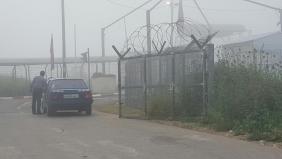'Anin, Barta'a-Reihan, Tayba-Rummana, Tura-Shaked
Barta’a-Reihan – a large regional checkpoint (operated by a civilian security firm)

A long, crowded line stretches from the main road all the way to the turnstile at the entrance to the terminal. Hundreds of younger and older Palestinians, on their way to work in Eastern Barta’a and in Israel, are stuck in this crash for a full hour or more, most of them quiet, some impatient. Shouts are heard around the turnstile. What happened? Ayad, the volunteer “usher,” is holding a tough discussion with people. Why? He keeps asking. “Why are you entering here? Get back in line!” Ayad (volunteering in his own free time) is doing the job for the occupation’s security firm. Without him, fights would very likely break out here, as we see happening in other checkpoints that process tens of thousands of workers into Israel every morning. People are eager to get to work on time, the system that operates the checkpoint – supposedly meant to stream them in with as little delay as possible – is clumsy and cannot adapt to the pace of passage. According to the Palestinians, for the past week there have not been enough windows (inspecting IDs) and passage has been terribly slow. People are late for their transport to work and lose money as a result.
We spoke with R., deputy manager of the checkpoint, and asked on behalf of the Palestinians, why only three windows were operating today inside the terminal, when it is obviously the reason for the serious delay. He knows. What are you doing about it? We’re doing what we can.
Every several minutes, the turnstile unlocks and about 70 people get through. Then it stops. At the same time, the other end of the line absorbs at least 50 new people. If the officials inside the terminal do not operate quickly, the line simply gets stuck for a long time. What are they waiting for?
Two young men approach, hesitatingly. They complain to us about something we’ve already heard: one of them is on the Shabak blacklist (prevented from entering Israel) but he has a valid work permit (a familiar phenomenon). He is not always allowed through, and of course no one explains why today he is granted permission to get in, and yesterday he wasn’t? We didn’t know what to say. We gave him Tami Sh.’s telephone number.
It’s the Occupation routine that ruins the lives and hopes of Palestinians. This is the ugly face the State of Israel shows for posterity.
06:45 Agricultural Checkpoint ‘Anin (opens twice a week in the morning and afternoon for farmers from ‘Anin whom the Separation Barrier has separated from their own lands)
Most of the farmers have already crossed the checkpoint into the ‘seamline zone’. The DCO vehicle as well as an armored carrier with soldiers are inside the checkpoint. According to M., one person was not allowed through because of an invalid permit.
07:00 “Fabric of life” Checkpoint Toura-Shaked
The heavy smog filling the region has not skipped this checkpoint, which looks deserted, it even adds a somewhat moonlike atmosphere. For a long time no one enters or exits. Two cars are waiting to cross, and do so for a long time until they are let through. Some people who have already crossed the checkpoint are waiting for a ride/transport to work. To our question “How are you?” one of them answers, “Great!” What do you mean, great? He stretches both hands towards the checkpoint and answers: “Need an explanation?” We had a laugh together.

08:05 Agricultural checkpoint Taiybe-Roumana (opens twice a week in the mornings and afternoons for farmers separated from their lands, and/or for family visits at Umm Al Fahm)
Opening time set by the occupation authorities is 8 a.m., but they themselves do not treat their own decisions seriously. Today, too, the checkpoint opened late, this time half an hour late. On Monday it was opened a whole hour late. The Palestinians stand and wait, and wait. Got to get home? Got to get to work? The checkpoint is usually operated by the Border Police.
According to the head of Roumana village council, the seamline zone here is about 400-600 sq. m. There are close family ties between the villages and the city of Umm Al Fahm (inside Israel).
People seem glad to see us, and even the religious-looking, bearded youngsters greet us or answer our ‘good morning’ with a smile. Neta and I believe that this is our second most important job here at the checkpoints – exchanging smiles. What the first is – we have not established yet…
